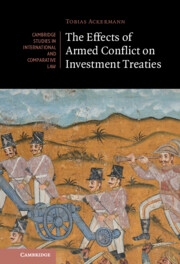Book contents
- The Effects of Armed Conflict on Investment Treaties
- Cambridge Studies in International and Comparative Law: 169
- The Effects of Armed Conflict on Investment Treaties
- Copyright page
- Dedication
- Contents
- Acknowledgements
- Table of Cases
- Table of International Agreements and Documents
- Table of Domestic Instruments and Documents
- Abbreviations
- Introduction
- Part I The Continuity of Investment Treaties
- Part II Investment Protection and the Role of International Humanitarian Law
- Part III Investment Protection Standards during Armed Conflict
- 5 Armed Conflict Clauses
- 6 Full Protection and Security
- 7 Expropriation
- 8 Fair and Equitable Treatment
- Part IV Exceptions and Defences
- Bibliography
- Index
- Cambridge Studies in International and Comparative Law:169
6 - Full Protection and Security
from Part III - Investment Protection Standards during Armed Conflict
Published online by Cambridge University Press: 11 August 2022
- The Effects of Armed Conflict on Investment Treaties
- Cambridge Studies in International and Comparative Law: 169
- The Effects of Armed Conflict on Investment Treaties
- Copyright page
- Dedication
- Contents
- Acknowledgements
- Table of Cases
- Table of International Agreements and Documents
- Table of Domestic Instruments and Documents
- Abbreviations
- Introduction
- Part I The Continuity of Investment Treaties
- Part II Investment Protection and the Role of International Humanitarian Law
- Part III Investment Protection Standards during Armed Conflict
- 5 Armed Conflict Clauses
- 6 Full Protection and Security
- 7 Expropriation
- 8 Fair and Equitable Treatment
- Part IV Exceptions and Defences
- Bibliography
- Index
- Cambridge Studies in International and Comparative Law:169
Summary
Chapter 6 closely analyses the operation of investment treaty clauses promising full protection and security. The chapter shows how armed conflict affects both dimensions of this standard significantly. It suggests that the duty to not cause unlawful harm to foreign investors and their invesments should be interpreted as a duty to comply with international humanitarian law standards when applied to the conduct of hostilities. This approach, deriving from the interaction of human rights with humanitarian rules, avoids normative inconsistencies. The due diligence obligation to protect foreign investors and their investments from third-party harm, on the other hand, should be understood as inherently sensitive to prevailing conditions. The state’s (constructed) knowledge of threats to foreign investments, its capacities and resources to counteract these threats, and the notion of reasonableness should guide the analysis under the due diligence standard. The latter element introduces a corrective balancing exercise, opening the way to factor in overriding military or humanitarian concerns.
Keywords
- Type
- Chapter
- Information
- The Effects of Armed Conflict on Investment Treaties , pp. 146 - 173Publisher: Cambridge University PressPrint publication year: 2022

